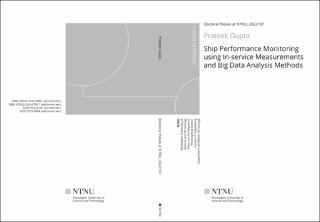Ship Performance Monitoring using In-service Measurements and Big Data Analysis Methods
Doctoral thesis
Permanent lenke
https://hdl.handle.net/11250/2988194Utgivelsesdato
2022Metadata
Vis full innførselSamlinger
- Institutt for marin teknikk [3397]
Sammendrag
Ship performance monitoring is quite important for ship owners as well as charter parties to optimize their profits. Moreover, the regulatory organizations, like IMO, has also become interested here in order to maintain the economic growth around the world while reducing the green house gas (GHG) emissions, primarily to hinder the effects of global warming. IMO has set several emission reduction targets until 2050 to limit the rise of global temperature. The performance of ships, therefore, needs to be optimized if these targets are to be achieved, and to ensure optimal performance for a ship over its entire life, it is required to develop reliable methods to continuously monitor its performance.
The current work focuses on developing data-driven methods for ship performance monitoring using the high frequency in-service data recorded onboard the ships. The data-driven methods, namely, Principal Component Regression (PCR), Partial Least Squares Regression (PLSR) and probabilistic Artificial Neural Network (probabilistic ANN), are calibrated using the in-service data. Linear methods, PCR and PLSR, are enhanced with some non-linear transformations, obtained from the domain knowledge, to capture the non-linearities in the ship’s hydrodynamic model.
A data processing framework is developed and streamlined to process the inservice data. Principal Component Analysis (PCA) is used for preliminary data analysis tasks, like correlation study, variable selection and outlier detection. A statistical hydrodynamic performance indicator, in the form of generalized admiralty coefficient (ΔmV n/Ps), for ships is established. The performance indicator is further used in the data-driven models to formulate a fouling growth factor (FGF), accounting for the fouling growth on the ship’s hull and propeller.
The calibrated data-driven models are used to predict the change in performance for two ships over several propeller and hull cleaning events. The results indicate improvement in the performance of at least one of the ships for almost all the cleaning events, with the highest improvement predicted for the hull cleaning event, which is as expected. Moreover, the linear methods with non-linear transformations produced comparable results with the fully non-linear method, indicating that the problem can be solved using transparent and interpretable linear methods.
Består av
Paper 1: Gupta, Prateek; Kim, Young-Rong; Steen, Sverre; Rasheed, Adil. Data Processing Framework for Ship Performance Analysis. arXiv.org 2022 https://doi.org/10.48550/arXiv.2202.01000Paper 2: Gupta, Prateek; Steen, Sverre; Rasheed, Adil. Big Data Analytics As a Tool to Monitor Hydrodynamic Performance of a Ship. I: ASME 2019 38th International Conference on Ocean, Offshore and Arctic Engineering. Volume 7A: Ocean Engineering. The American Society of Mechanical Engineers (ASME) 2019 Paper No: OMAE2019-95815, V07AT06A059https://doi.org/10.1115/OMAE2019-95815
Paper 3: Gupta, Prateek; Taskar, Bhushan; Steen, Sverre; Rasheed, Adil. Statistical modeling of Ship’s hydrodynamic performance indicator. Applied Ocean Research 2021 ;Volum 111 https://doi.org/10.1016/j.apor.2021.102623 This is an open access article under the CC BY license
Paper 4: Gupta, Prateek; Rasheed, Adil; Steen, Sverre. Ship Performance Monitoring using Machine-learning. © 2022. This manuscript version is made available under the CC-BY-NC-ND 4.0 license https://creativecommons.org/licenses/by-nc-nd/4.0/
